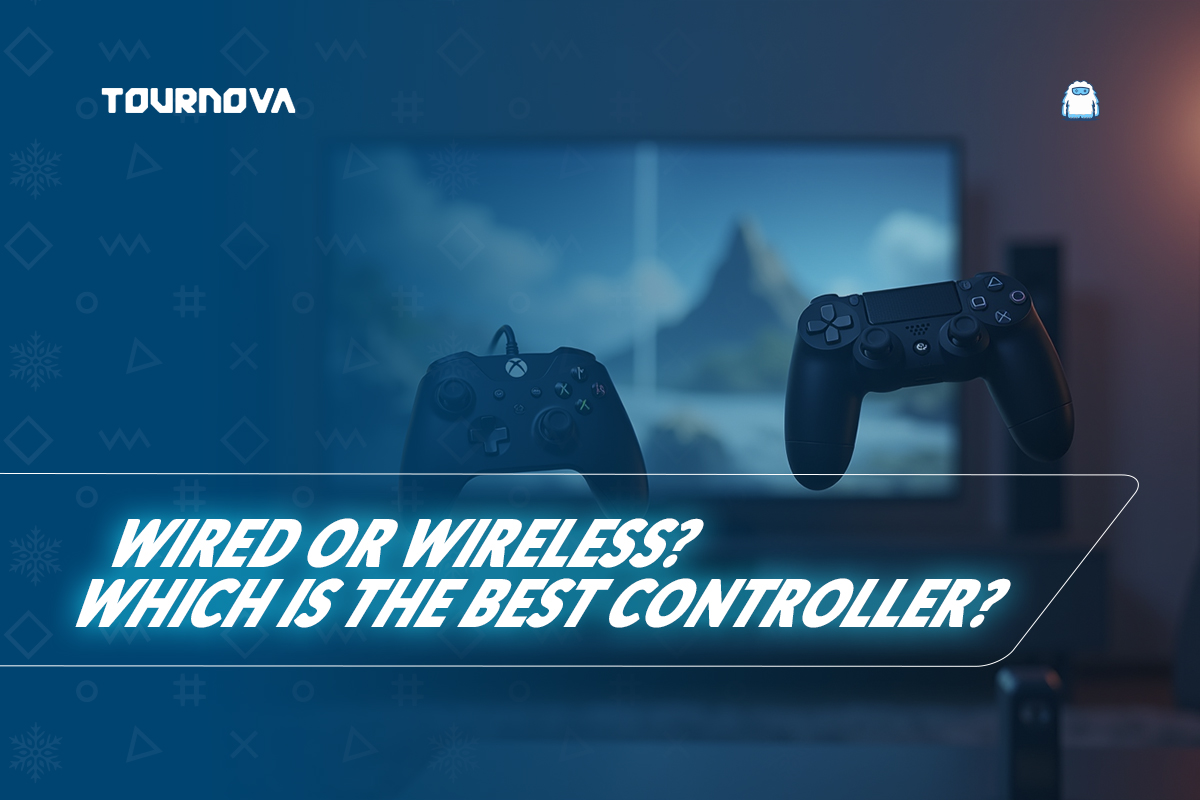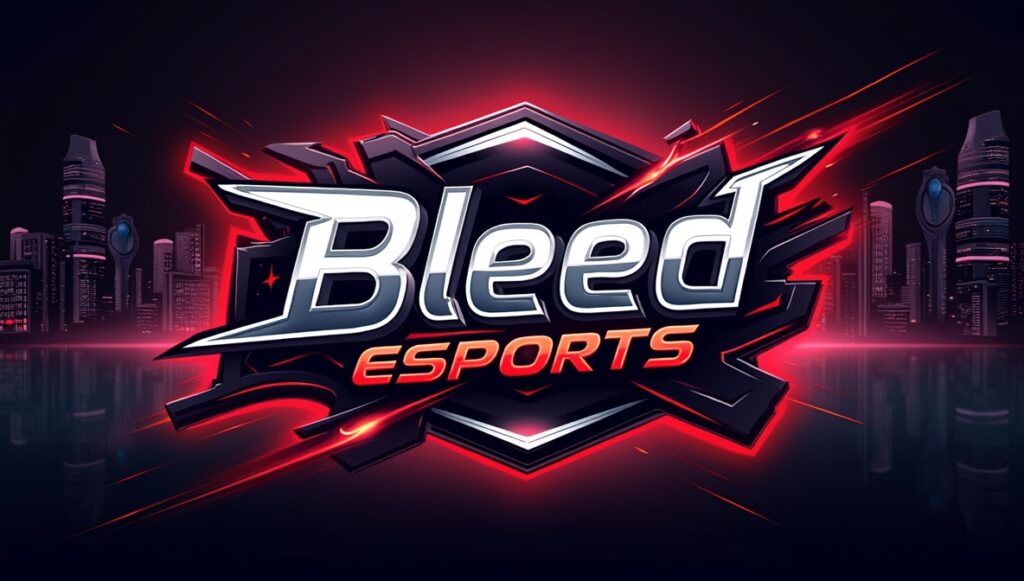Some debates never really go away in gaming, do they? We remember arguing with friends at midnight over which controller was clutch for FIFA tournaments, or trying to convince our Call of Duty squad that ditching a wire was worth it, if only for the freedom to gesture wildly after a last-second win. The truth? The “wired vs. wireless controllers” choice is still a hot topic, and for pro gamers looking to get every ounce of performance from their setup, that decision shapes how we train and compete.
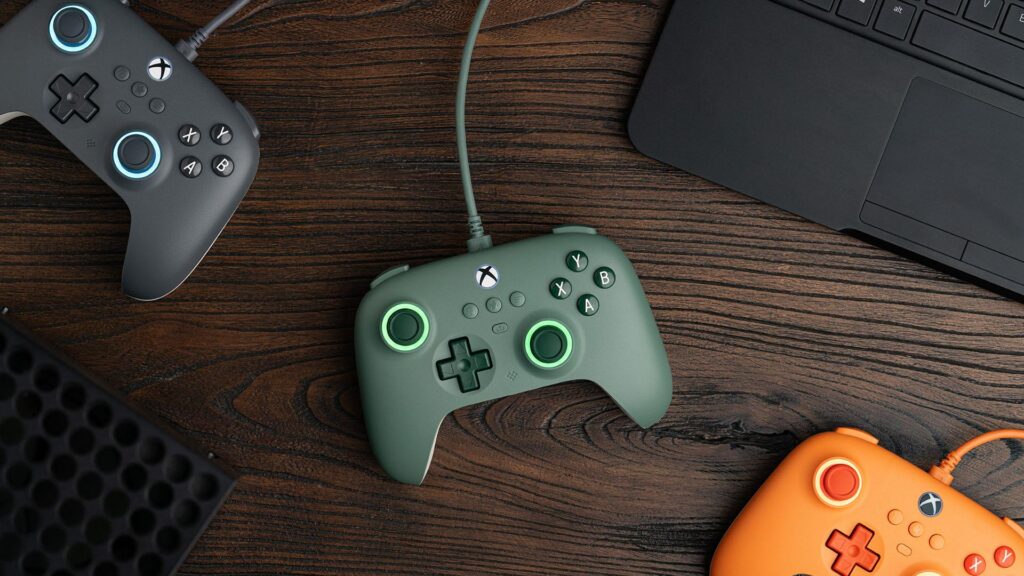
- Wireless controllers grant the freedom to move around freely, ideal for relaxed couch gaming.
Wired vs. Wireless Controllers: Pros & Cons For Pro Gamers
Before we sprint into the pros and cons, let’s talk about why this decision actually matters. Competitive matches move faster than we can blink, and when every frame counts, controller performance isn’t just “nice”; it’s critical. Here’s our real-life walkthrough of what both options actually bring to the table for esports hopefuls and veterans alike.
1. Introduction: The Controller Debate in Pro Gaming
During practice, we’ve swapped controllers more often than some people change socks. Esports tournaments, from Street Fighter Evo showdowns to high-stakes Rocket League finals, have proven again and again: controller choice isn’t just preference; it’s about millisecond-level responsiveness, steadfast reliability, and, let’s admit it, convenience. So, which side are you on?
2. Wired Controllers: The Competitive Standard
Whenever we join a LAN event or watch top-tier tourneys, we’re greeted with a jungle of cables behind every console. Wired vs. wireless controllers is a common debate, but wired controllers are nearly always the default, mostly because of their bulletproof, no-lag connection and easy plug-and-play setup. We’ve never worried about dropping a match to a battery dying or a Bluetooth glitch when we’re hardwired in. That reliable, always-on nature, plus their rugged physical build, make wired controllers the unsung hero of sweaty, all-night training sessions.
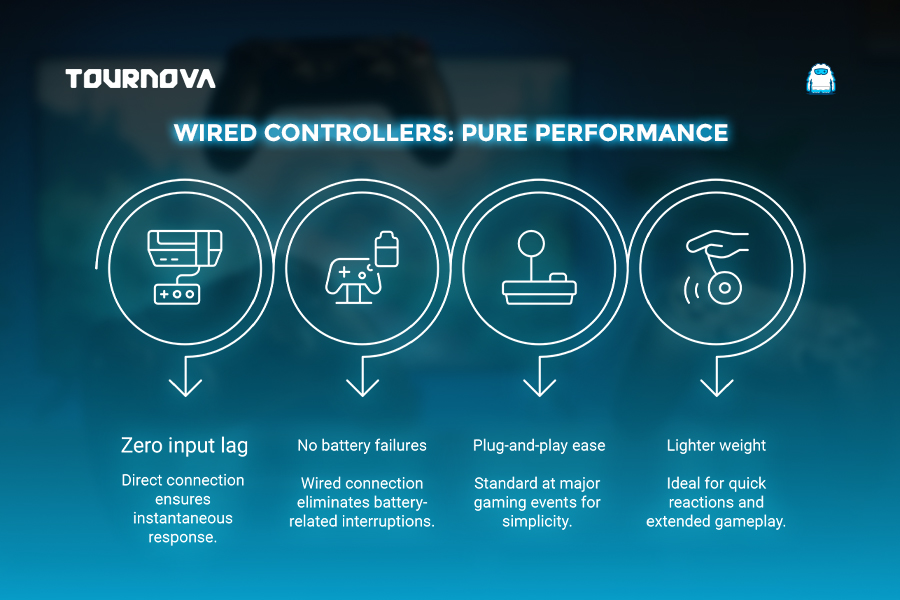
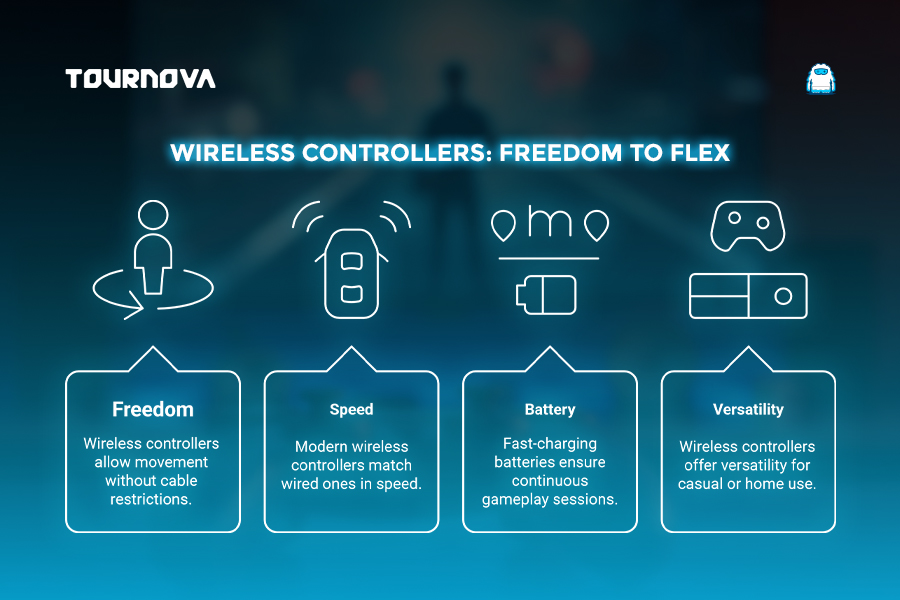
3. Wireless Controllers: The Freedom Advantage
On the flip side, wireless controllers have saved us from a lot of accidental drinks knocked over by cords (it happens, trust us!). The freedom to move, kick back, or celebrate a clutch moment without being tethered; that’s real luxury. These days, low-latency wireless modes and fast-charging batteries have made wireless options like the Xbox Wireless Controller and PlayStation DualSense nearly indistinguishable from their wired kin in casual tests. No more tripping over cables when you leap for a game-winning goal in FIFA.
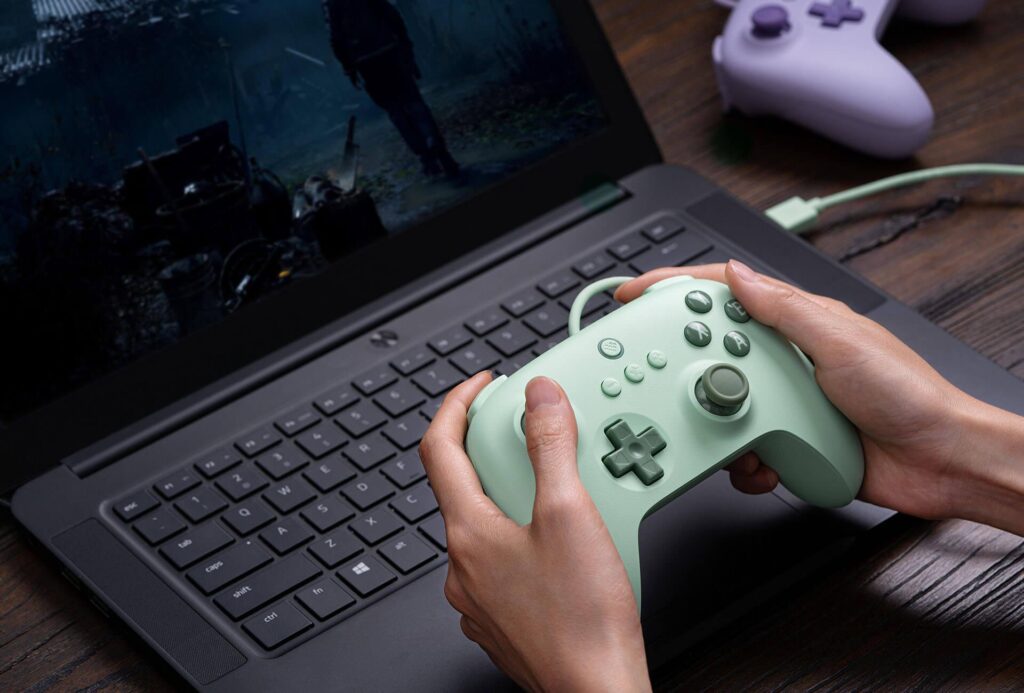
- Wireless pads need recharging or batteries, which can interrupt long sessions.
4. Latency & Input Lag: How Much Does It Matter?
Latency feels invisible until you care about it. Competitive games like Tekken 8 or Super Smash Bros. Ultimate are brutally unforgiving of even a hint of delay. The wired vs. wireless controllers debate comes into sharp focus, as wired controllers shine brightest here: their direct line to the console or PC keeps input lag at the absolute minimum, which is why so many fighting game pros swear by them. Wireless tech has closed the gap (especially in newer models), but in tournaments where frames can mean victory or defeat, most stick with wired for the peace of mind.
5. Reliability & Battery Life: Tournament Considerations
There’s nothing quite like the horror of seeing that low-battery warning blinking mid-match. Wired controllers never stress us out in this regard; they’re always juiced and ready to go. Wireless models have come a long way, offering hours of uninterrupted play and even on-the-fly battery swaps during marathon sessions. Still, interference, rare dropouts, or forgotten charging can spell disaster in a live tournament. When the stakes are high, some pros keep a wired backup on hand, just in case.
6. Comfort, Ergonomics, and Play Style
Who knew a little weight difference could matter so much after a 4-hour session? When considering wired vs. wireless controllers, wireless controllers generally feel a tad heavier because of the battery inside, but, funnily enough, losing the cord really does reduce desk clutter and lets us twist and tilt however we like. That said, the shape and comfort of the grip usually depend on the brand, not whether it’s wired or wireless, and personal taste varies wildly across our team.
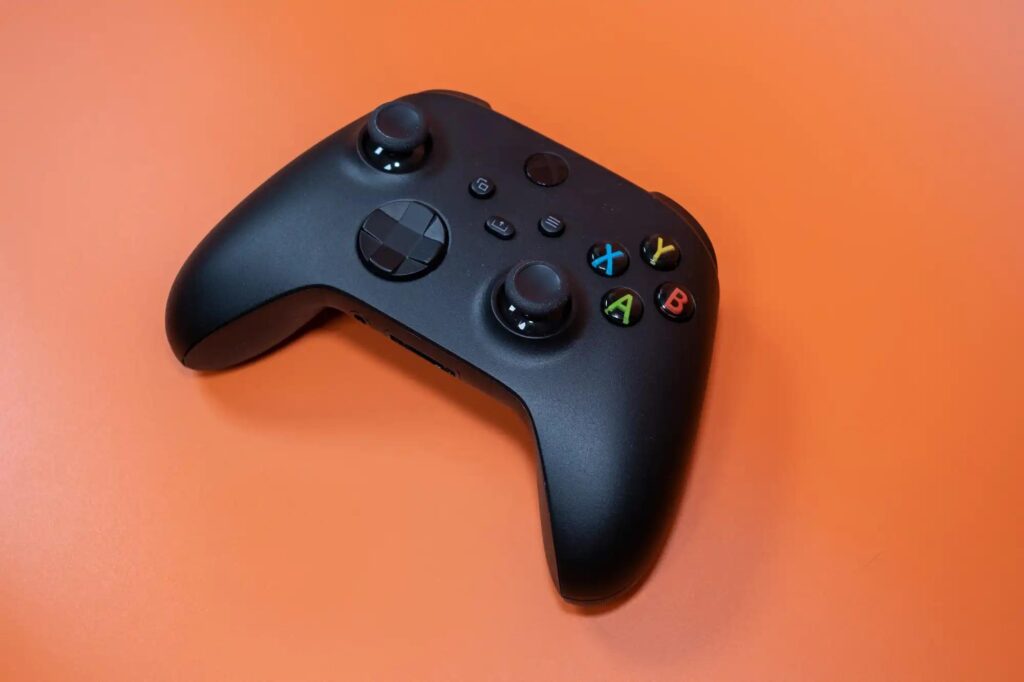
- Wireless setups avoid cable clutter and tripping hazards in your gaming space.
7. Pro Player Preferences: What Do the Pros Use?
Scanning the setups of top esports teams is something of a hobby for us. At events like Call of Duty League or the FIFA eWorld Cup, it’s common to see the pros locked in with wired controllers; some events even require them to guarantee fairness and consistency (no accidental disconnects here!). Notably, some streamers and pro players, especially outside tournaments, opt for high-end wireless controllers, like the SCUF Instinct Pro or Sony DualSense Edge, for their versatility at home. In the end, rules and risk tolerance usually decide the split.
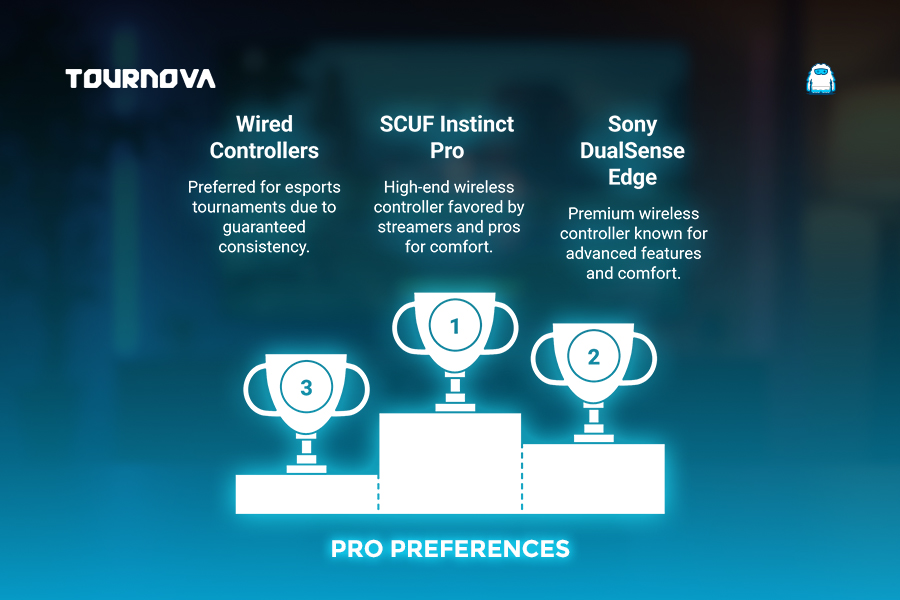
Tournova: Where Tournament Control Is Always in Your Hands
Choosing between wired vs. wireless controllers is all about maximizing responsiveness, flexibility, and reliability during clutch moments, and Tournova brings that same focus to the world of esports tournament management. By integrating directly with Telegram and Discord, Tournova ensures seamless, real-time control over every stage of your tournament experience; no “lag,” signal drops, or organizational headaches. Tournament organizers benefit from automated brackets, instant result tracking, and transparent prize distribution, all engineered for stability and efficiency, just like the trusted feel of a wired controller in a championship match.
But Tournova’s versatility is equally compelling: whether you crave the simple plug-and-play approach of wired tools or the flexibility of a wireless setup, Tournova adapts to both hyper-casual and highly competitive needs. The internal token economy and customizable features let every player and organizer fine-tune their experience, mirroring how gamers optimize their gear for performance and comfort. With Tournova, you’re always in control; wired in or playing freely, unlocking your best tournament performance every time.
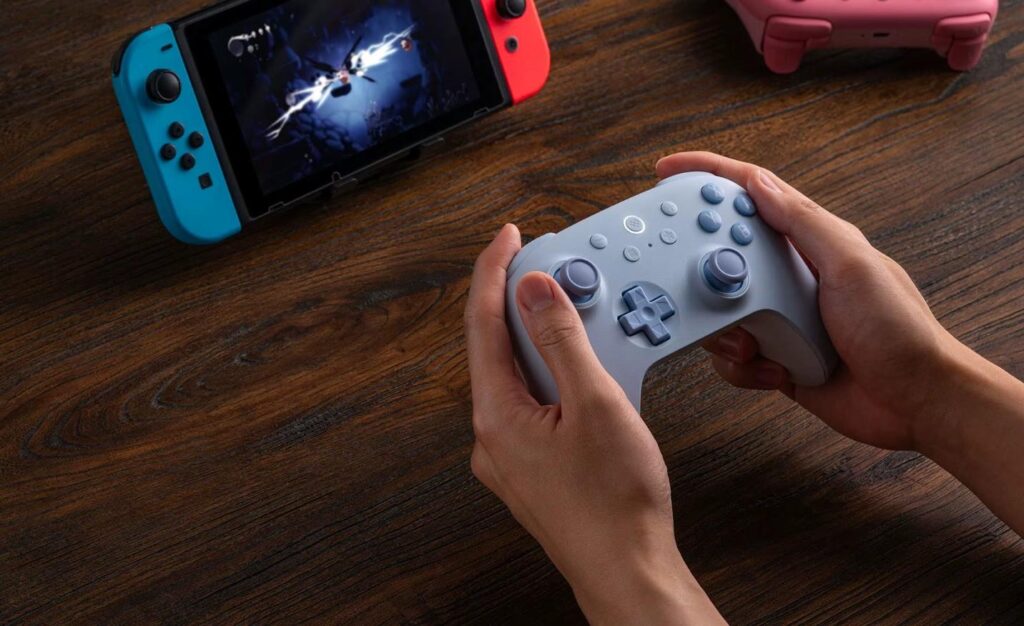
- Wired controllers require cable management and limit movement range.
8. Wrapping Up: Which Controller Delivers the Edge for Pros?
Ultimately, finding your best-fit controller is personal and tactical. For the most critical matches, the wired vs. wireless controllers debate often swings towards wired, where reliability and speed still make them our top pick; nothing ruins a clutch round faster than lag or a dead battery. That said, wireless tech shines for home sessions and casual grind, offering comfort and range we love. Test both, weigh your needs, and always read the tournament handbook; sometimes the smallest choice in your kit makes all the difference. So, what controller type do you trust in clutch moments, wired or wireless? Share your experience below; we’re always swapping notes and tips!
Read the hottest in-depth Esports Guides on Tournova.
9. FAQs: Choosing the Right Controller for Competitive Play
1. Do wired controllers last longer than wireless ones?
Generally, yes; without batteries to degrade and fewer points of failure, a wired controller can stay tournament-ready for years with basic care.
2. Are there any wireless controllers approved for tournaments?
Some tournaments approve specific wireless models if they support “wired mode” or can physically tether, but always check the event’s official rules.
3. How much does the extra weight of wireless controllers actually affect play?
It’s subtle, but after hours, a lighter-weighted controller can make rapid movements feel easier, especially in games requiring quick reflexes or combos.
4. Can I mix wired and wireless controllers on the same competitive setup?
You sure can, but for fairness, many team environments or tourneys specify one type, usually wired, for everyone to ensure a level playing field.

